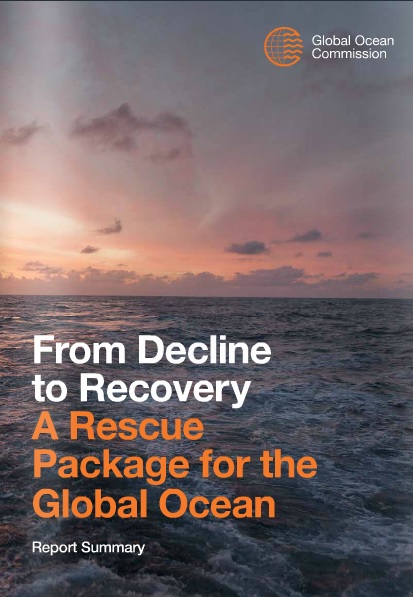Rescuing the Ocean from Decline

The health of the global ocean is in decline and a five-year integrated rescue package is what’s needed to bring it back to life, according to a new report by the Global Ocean Commission.
The Commission has spent 18 months looking in to the decline of the ocean and has come up with a rescue package of eight proposals to restore and protect its natural capital and services. Its findings identified a lack of adequate governance on the high seas as the key issue.
Now, the Commission is calling for the negotiation of a new agreement under the UN Convention on the Law of the Sea (UNCLOS) to prioritise ocean health and resilience, restore ocean productivity, guard against irresponsible, inefficient and wasteful exploitation, and allow for the creation of high seas marine protected areas (MPAs).
“Unless we turn the tide on ocean decline within five years, the international community should consider turning the high seas into an off-limits regeneration zone until its condition is restored,” said José María, co-chair of the Commission.
The Commission says such an agreement would extend governance to the 64% of the global ocean that lies outside national jurisdiction, the protection of which is seen as essential for overall ocean health.
The current lack of high seas governance is resulting in mismanagement of resources, lost revenue and global inequity, the Commission reported, and valuable high seas services such as carbon sequestration, worth between US$74 and US$222bn annually, are in jeopardy.
“Without proper governance, a minority will continue to abuse the freedom of the high seas, plunder the riches that lie beneath the waves, take more than a fair share, and benefit at the expense of the rest of us,” added Trevor Manuel, co-chair.
Government subsidies for high seas fishing, carried out by just 10 nations, should be immediately capped and eliminated within five years, said the Commission. About 60% of such subsidies directly encourage unsustainable practices, and without them, high seas fisheries would be not financially viable.
The Commission’s proposals also call for mandatory tracking of all vessels fishing in the high seas, a ban on the transhipment of fish at sea, measures to end plastics pollution, and binding standards for the regulation and control of offshore oil and gas exploration and exploitation.
So far, the Commission’s proposals for action have received a positive response from significant players with ocean interests including UNESCO, Environmental Justice Foundation, International Chamber of Shipping and Wallenius Wilhelmsen Logistics, among others.
See more at: http://www.worldfishing.net/news101/industry-news/rescuing-the-ocean-from-decline#sthash.jZ4QBent.dpuf
Photo courtesy of John Allan, geograph.org.uk




